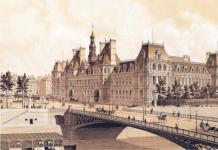(25. X. 1838, Paris - 3. VI. 1875, Bougival, near Paris)
Georges Bizet gained worldwide fame as the author of one, albeit very popular, work. In the history of music, such cases are rare. This work was the opera "Carmen". Bizet was born in Paris on October 25, 1838. He was named after the sonorous names of three commanders: Alexander - Caesar - Leopold, but in the family they called him Georges. With this new name, Bizet went down in history. His parents were musical: his father was a singing teacher, his mother played the piano and became his first music teacher; They played a lot of music in the house.
The boy's outstanding abilities were revealed early: at the age of four he already knew music, at ten he entered the Paris Conservatory, where he stayed for nine years. Despite the fact that, as Bizet later said, he “devoted himself to music only reluctantly” - he was more attracted to literature - his studies at the conservatory were successful. The young musician repeatedly received prizes at internal conservatory competitions - in piano and organ playing, polyphony and composition, which ended in 1857 with the receipt of the Grand Prize of Rome, which granted the right to a long trip abroad.
Phenomenally gifted with an ear for music, memory, and creative intuition, Bizet easily mastered the knowledge that the conservatory provided. True, the composition theory course suffered from dogmatism. Bizet studied most outside the conservatory with Gounod, with whom, despite the significant difference in age, he established warm, friendly relations. But we must also pay tribute to his immediate teacher Fromental Halévy, a subtle and serious musician, with whom Bizet later became related by marrying his daughter.
During his years at the conservatory, Bizet created many works. The best among them is a symphony written by a seventeen-year-old author in a very short time - in seventeen days. This symphony, first published in 1935, is now successfully performed. Her music attracts with its classical precision of form, clarity and liveliness of expression, and light coloring, which would later become an integral quality of Bizet’s individual style. In the year he graduated from the conservatory, having composed a cantata on an ancient legendary plot, he took part in a competition announced by Offenbach to write a one-act operetta. Together with the work of Lecoq, who later became famous in this genre, the prize was awarded to Bizet's operetta Doctor Miracle.
However, if by this time Bizet the composer was spoken of only as a promising talent, then as a pianist he achieved universal recognition. Later, in 1863, Berlioz wrote: “Bizet reads scores incomparably... His pianistic talent is so great that in the piano transcription of orchestral scores, which he does at first sight, no difficulties can stop him. After Liszt and Mendelssohn, there are not many performers of his strength.”
Bizet spent 1857-1860 as a laureate of the Conservatory in Italy. These were years of greedily absorbing various life experiences, among which, however, musical ones were in last place. “Bad taste poisons Italy,” Bizet complained. “This is a lost country for art.” But he read a lot, traveled, got acquainted with the life of peasants and shepherds. His creative imagination, as it will be later, lights up with many plans. “My head is full of Shakespeare... But where can I find a librettist!” - Bizet complains. He is also interested in the stories of Moliere, Hugo, Hoffmann, and Homer. One feels that he has not yet found a topic that is close to him and is creatively scattered. But one thing is clear - his interests lie in the field of theater music.
This was partly due to practical considerations - it is easier to achieve success here. Bizet half-jokingly wrote to his mother: “When I get 100 thousand francs (that is, I provide for myself until death), dad and I will stop giving lessons. We'll start life as a rentier, which isn't a bad thing at all. 100 thousand francs is nothing: two small successes in comic opera. A success like “The Prophet” (Meyerbeer’s opera) brings in almost a million. So, this is not a castle in the air!..”
But it was not only mercantile considerations, due to the family’s more than modest material resources, that prompted him to do this. The musical theater attracted Bizet, his letters are full of questions about Parisian opera premieres. As a result, he decided to write a comic opera called Don Procopio. The score sent to Paris did not receive approval from the venerable professors, although the author’s “casual and brilliant manner, fresh and bold style” was still noted. The subject matter of this essay caused severe condemnation. “We must point out that M. Bizet,” we read in the conservatory’s review, “is that he presented a comic opera when the rule required a mass.” But clerical subjects are alien to Bizet. And after a short creative pause, he began to write the symphony-cantata “Vasco da Gama” based on the plot of “The Lusiad” - the famous epic poem by the classic of Portuguese literature Luis Camões. He turned to the vocal-symphonic genre, widespread in France since the time of Berlioz, and to oriental themes, the popularity of which was strengthened by the success of Félicien David's ode-symphony “The Desert” (1844). Next, Bizet created a number of orchestral pieces, some of which would later be included in the symphonic suite “Memories of Rome.” Now the peculiar features of the composer’s style with his desire to embody colorful, colorful folk scenes and pictures of life, full of dynamics and movement, are more clearly evident. After a three-year stay in Italy, Bizet returned to Paris, confident in his abilities. But bitter disappointment awaited him: the path to public recognition in the Second Empire was difficult and thorny. The difficult years of struggle for existence begin.
Bizet contains seven private lessons, composing music in a light genre, transcriptions and proofreading of other people's works. In his letters we find exciting lines: “I haven’t slept for three nights, my soul is gloomy, and tomorrow I need to write fun dance music.” Or in another letter: “I work like a black man, I’m exhausted, I’m literally torn to pieces, I’m stunned, finishing a four-hand adaptation of Hamlet (A. Thom’s opera). What is the work! I just finished romances for a new publisher. I'm afraid it turned out mediocre, but I need money. Money, always money - to hell!..” In such an overstrain of creative forces, Bizet’s entire subsequent life passes. This was the reason for such an early death of the brilliant composer.
Bizet did not choose the easier path in art. He abandoned his career as a pianist, which undoubtedly promised him faster and more effective success. But Bizet wanted to devote himself completely to composing and therefore discarded everything that could interfere with it. He was attracted by many and varied operatic ideas, some were completed, but the demanding author took the already completed scores from the theater. This happened, for example, with the opera “Ivan the Terrible,” discovered only in the 30s of our century. However, two operas were staged. In 1863, the premiere of the opera “The Pearl Fishers” took place.
Its plot is traditional. This was an oriental theme that was fashionable in France at that time. Bizet's opera is among the works that open this list. Its action takes place on the island of Ceylon, among pearl divers. Despite the formulaic dramatic situations and conventional stage action, Bizet’s music convinces with its melodic richness, naturalness and beauty of vocal parts, and fullness of life. This was not lost on Berlioz, who noted in his review that the opera’s score “contains many wonderful expressive moments, full of fire and rich color.” Crowd scenes and lyrical or dramatic episodes of the opera are also distinguished by their brightness. However, what was fresh and new in Bizet’s work went unnoticed. The opera was not a great success, although it ran for eighteen performances. With the exception of Berlioz, criticism reacted coldly to her. The premiere of the next opera, “The Beauty of Perth,” took place in 1867. The plot of Walter Scott's novel of the same name appeared in the libretto in a distorted, primitive form; there is especially a lot of cliche and cliché in the final act. “This is a spectacular play,” wrote Bizet while working on the opera, “but the characters are poorly outlined.” The composer failed to complete them with his music. At the same time, in comparison with its predecessor, this opera contains many concessions to the prevailing tastes of the bourgeois public, which caused a sharp rebuke from some progressive critics. Bizet was forced to agree with them with bitterness.
Failure temporarily disarmed Bizet. "I'm going through a crisis," he says. In the autumn of the same 1872, the premiere of another work by Bizet took place. This is music for Alphonse Daudet’s play “The Arlesian”, magnificent in color and expressiveness. The composer filled the performance with a large number of musical numbers, sometimes representing artistically complete plays. Music with such outstanding artistic merit survived Daudet's play, establishing itself on the concert stage. Two suites from Le d'Arlesienne - the first composed by the author himself (1872), the second by his friend Ernest Guiraud (1885) - were included in the golden fund of world symphonic literature.
Bizet was aware of the large role the music for Le Arlesienne played in his creative evolution. He wrote:
“Whatever happens, I am satisfied that I have entered on this path, which I must not leave and from which I will never leave. I'm sure I've found my way." This road led him to Carmen. Bizet became interested in the plot of “Carmen” while working on the opera “Djamile”, and in 1873-1874 he began to work on finishing the libretto and writing music. The plot of the opera is borrowed from Prosper Merimee’s short story “Carmen”, or more precisely, from its third chapter, which contains Jose’s story about the drama of his life. Experienced masters of theatrical dramaturgy, Meliac and Halevi, created an excellent, scenically effective libretto, the dramatic situations and text of which clearly outline the characters of the characters in the play. On March 3, 1875, the premiere took place at the Opera Comic Theater. Three months later, on June 3, Bizet suddenly died, without having time to complete a number of his other works.
His premature death was probably hastened by the social scandal that erupted around Carmen. The jaded bourgeoisie - ordinary visitors to boxes and stalls - found the plot of the opera obscene, and the music too serious and complex. Press reviews were almost unanimously negative. At the beginning of the next year, 1876, “Carmen” disappeared for a long time from the repertoire of Parisian theaters, and at the same time its triumphant success began on the theatrical stage of foreign countries.
Tchaikovsky immediately noted its outstanding artistic value. Already in 1875 he had the score of “Carmen”, and at the beginning of 1876 he saw it on the stage of the Parisian “Opera-Comique”. In 1877, Tchaikovsky wrote: “... I learned it by heart, all from beginning to end.” And in 1880 he stated: “In my opinion, this is in the full sense of the word a masterpiece, that is, one of those few things that are destined to reflect to the greatest extent the musical aspirations of an entire era.” And then he prophetically predicted: “I am convinced that in ten years Carmen will be the most popular opera in the world...” Bizet’s music endowed Carmen with folk character traits. The introduction of folk scenes, which occupy an important place in the opera, gave a different light and a different flavor to Merimee’s novella. The image of the heroine is also permeated with the power of love of life radiated from folk scenes. The glorification of open, simple and strong feelings, a direct, impulsive attitude towards life is the main feature of Bizet’s opera, its high ethical value. “Carmen,” wrote Romain Rolland, “is all outside, all life, all light without shadows, without understatement.”
Bizet's music further emphasized the contrast and dynamics of dramatic development: it is characterized by liveliness, brilliance, and variety of movements. These qualities, typical of the composer, perfectly corresponded to the depiction of the action of the Spanish plot. Only in rare cases, using folk melodies, did Bizet aptly convey the Spanish national flavor. The historical significance of Bizet’s opera lies not only in its enduring artistic value, but also in the fact that for the first time on the stage of the opera stage, the drama of ordinary people was depicted with such skill, affirming the ethical rights and dignity of man, glorifying the people as the source of life, light, joy .
In Paris, the production of Carmen was nevertheless resumed in 1883. Since then, “Carmen” has occupied one of the first places in the repertoire of world musical theater.
Georges Bizet is a short biography of the French composer presented in this article.
Georges Bizet short biography
Alexandre César Leopold Bizet was born October 25, 1838 to Paris in a musical family. The boy's talent was discovered early: at the age of four he already knew all the notes, and at the age of nine he entered the famous Paris Conservatory. He had phenomenal hearing, memory, brilliant pianistic and compositional abilities, which delighted all his teachers.
Bizet was awarded more than once at conservatory competitions, and after completing courses at the conservatory in 1857, he was awarded the right to spend 3 whole years in Italy for the purpose of improvement. These were years of intense creative search. The composer tried his hand at various musical genres: he created a symphonic suite, a one-act operetta, a cantata, piano romances and plays. But Bizet's true vocation was musical theater.
Upon returning from Italy, he wrote the opera “The Pearl Fishers” (1863) on an exotic plot, telling about the love drama of Leila and Nadir, and after that “The Beauty of Perth” (1867). Both musical works were not successful, and the composer continued his intense search for something new in his work. “I am going through a crisis,” he wrote in those years.
The opera “Djamile” (1872) marked the onset of his creative maturity - psychological expressiveness in its music is perfectly combined with the brightness of oriental flavor. Then the music was created for A. Daudet’s drama “The Arlesian”. Opera " Carmen“, was Bizet’s greatest creative achievement and at the same time his swan song. But its premiere ended in failure. He died of a heart attack just three months later, not knowing that Carmen would prove to be the pinnacle of his success and forever rank among the world's most recognizable and popular classics.
Interesting facts from the life of the French composer are presented in this article.
Georges Bizet interesting facts
Alexandre-Cesar-Leopold Bizet was born in Paris in 1838. He was given such a long name in honor of famous commanders. But the whole world knows him as Georges Bizet
The future composer's family was musical - his father worked as a music teacher, and his mother played the piano wonderfully
Already at the age of nine, Georges Bizet demonstrated his extraordinary musical talent, and therefore was enrolled in the Paris Conservatory, despite such a young age. He became a professional composer at age 19
The pinnacle of his musical creativity is the opera Carmen. But "Carmen" was not appreciated by the musical world of that time. And only after the death of the composer, his musical works were highly appreciated by music connoisseurs and came out on top in their popularity.
He was in love with Lady Lionel, the opera diva, writer, Countess de Chabrilan. She was 12 years older than him and despised Georges Bizet in every possible way, using him whenever it was convenient for her
He was married to Genevieve Halévy, who cheated on him with Elie Delaborde, a teacher at the Paris Conservatory. But still the couple had a child - son Jean
Most of Georges Bizet's musical works were included in the Golden Fund of World Classical Music
After the first not very successful production of the opera Carmen, out of despair he rushed to swim in the cold waters of the Seine. The next day the composer came down with a terrible fever. He began to suddenly stall, his arms and legs went numb. That afternoon he had a heart attack. The composer died before four months before the stunning success of Carmen at the Vienna Opera, at the age of 37.
We hope that from this article you learned interesting facts about George Bize
Georges Bizet. Pages of life and creativityGeorges Bizet (1838-1875)
Georges Bizet was born in 1838 in Paris. His father, a singing teacher, discovered amazing musical abilities in his nine-year-old son and sent him to the Paris Conservatory, where he studied piano with Marmontel, organ with Benoit, harmony with Zimmermann and composition with Halévy.
During his studies at the conservatory, Bizet took part in nine competitions and took first place in all of them.
In 1857, after graduating from the conservatory, he received the Rome Prize and went to Italy to improve his skills there. It was there in Italy, in addition to music, that another passion of Bizet appeared.
Overweight and shortsighted, with curls that curled so tightly that they were difficult to comb, Bizet did not consider himself attractive to women. He always spoke quickly, a little confusingly, and was sure that women did not like this manner of expression at all. His hands were also constantly sweating, which he was also terribly embarrassed about and blushed all the time.
Georges met the funny and flirtatious Giuseppa in Italy and, of course, began inviting her to Paris. The young man was intoxicated with happiness and kept repeating: “I’m not rich, but making money is so easy. Two successful comic operas, and we will live like kings.” The letter about his mother's illness took him by surprise. He left with Giuseppa's promise to come as soon as his mother felt better.
Father grieved in one room, Georges in another. Money was needed to fight disease and poverty. If Georges could now write a work of genius that would bring him a lot of money, but it takes time, and he doesn’t have it.
While abroad, Bizet composed a two-act Italian opera Don Procopio, two movements of a symphony, an overture and a one-act comic opera Guzla Zmira.
In 1863, he returned to Paris, where soon his opera “The Pearl Fishers” was staged on the stage of the Lyric Theater, which was not successful.
Bizet’s next opera, La Belle de Perth, did not gain public recognition either.
Self-criticism and a sober awareness of the shortcomings of “The Beauty of Perth” became the key to Bizet’s future achievements: “This is a spectacular play, but the characters are poorly outlined... The school of hackneyed roulades and lies is dead - dead forever! Let’s bury her without regret, without worry - and move on!”
But, despite the failures, it was during this period that Bizet met his love.
Passing by his teacher’s house, he was overcome by the desire to go where he felt good and calm. Here he met the teacher’s grown-up daughter.
Their romance was not swift. Finally, Georges proposed. It seemed as if the sun had finally begun to shine into his difficult, long-suffering life. Genevieve took care of the household chores and cut down on expenses, surrounded Bizet with tenderness and care, and the composer was able to work again.
The family idyll was short-lived. Soon the wife got tired of her husband’s constant absences and his eternal busyness.
The lesson that day was canceled, the student fell ill, and Bizet came home ahead of schedule. His only desire was to sit down and start writing, because he had an order - the comic opera “Dzhamile”. Voices were heard in the dining room. His wife laughed, the male baritone echoed her...
Failures with operas were compensated by the popularity that Bizet’s works from the field of symphonic music won among listeners, including the music for A. Daudet’s drama “La Arlesienne” and the overture “Motherland”, the symphony “Rome” and the suite “Child’s Games”.
In 1871, the comic opera “Djamile” was completed, a year later he wrote “Les Arlesiennes”, both of them were staged and were a great success. It was a gift of fate. But his wife gave him an even greater gift by giving birth to a son, Jean. But Bizet needed to work even more. A serious opera was conceived - “Carmen”.
The prototype of the main character should be Mogador with her passion. Music thatcame out of the pen, did not allow Bizet to sleep. And now, finally, the premiere. The Paris Opera House is full. Bizet, standing behind the scenes, was cold with fear. "Carmen" couldn't be another failure...
The first act is over. Cold reception, liquid claps. The production turned out to be very mediocre. Nobody appreciated the music. Genevieve could not stand it and left the hall. Bizet was crushed. He threw himself into the cold water of the Seine and fell down with a fever the next morning. Deafness set in, and my arms and legs went numb. Then there was a heart attack. The composer alternately regained consciousness and became delirious.
Georges Bizet died at the age of 37, less than four months before the enchanting success of Carmen at the Vienna Opera.
http://www.muzzal.ru/bize.htm
How else can you characterize the composer whom P.I. himself Tchaikovsky called him a genius, and called his work - the opera "Carmen" - a real masterpiece, imbued with genuine feeling and real inspiration. Georges Bizet is an outstanding French composer who worked in the era of romanticism. His entire creative path was thorny, and life was a continuous obstacle course. However, despite all the difficulties and thanks to his extraordinary talent, the great Frenchman gave the world a unique work, which became one of the most popular in its genre and glorified the composer for all time.
Read a short biography of Georges Bizet and many interesting facts about the composer on our page.
Brief biography of Bizet
On October 25, 1838, in Paris, on the street Tour d'Auvergne, a boy was born into the family of singing teacher Adolphe-Aman Bizet and his wife Aimee, whom loving parents named in honor of three great emperors: Alexander Cesar Leopold. However, at baptism he received a simple the French name Georges, which remained with him forever.

From the first days of his life, the child listened to a lot of music - these were his mother’s tender lullabies, as well as educational vocalizations of his father’s students. When the baby was four years old, Eme began teaching him how to read music, and at the age of five she sat her son at the piano. Bizet’s biography says that at the age of six, Georges was sent to school, where the inquisitive child became very addicted to reading, which, according to his mother, distracted the boy from his music lessons, which the boy had to sit for hours on end.
The phenomenal musical abilities that Georges possessed and his diligent studies bore fruit. After the audition, which caused surprised delight among the professors of the Paris Conservatory, the nine-year-old child was enrolled as a volunteer in a prestigious educational institution in the class of the famous A. Marmontel. Possessing a lively character, a curious and emotional student who grasped everything on the fly, the professor really liked him; working with him gave the teacher great pleasure. But the ten-year-old boy made progress not only in playing the piano. In the competition for solfeggio Having demonstrated a phenomenal ear for music and memory, he earned first prize and was honored to receive free additional lessons in instrument and composition from the outstanding P. Zimmerman.

Georges's conservatory training as a performer was nearing its end, and the path of a concert musician was opening up before him, although the young man was not at all interested in this prospect. Since P. Zimmerman began studying composition with him, the young man had a new dream: to compose music for the theater. Therefore, after completing a piano course with A. Mormontel, Georges immediately entered the composition class of F. Halévy, under whose guidance he composed a lot and enthusiastically, trying himself in various musical genres. In addition, Bizet enthusiastically studied in the organ class of Professor F. Benois, where he achieved significant results, first winning the second and then the first prize at the Conservatory in performance on the instrument.
In 1856, at the convincing insistence of F. Golevy, Georges took part in the competition of the Academy of Fine Arts. The first, the so-called Rome Prize, gave young talent the opportunity to train for two years in the Italian capital and a year in the German capital. At the end of this practice, the young author was given the right to premiere a one-act theatrical musical work in one of the theaters in France. Unfortunately, this attempt was not entirely successful: no one was awarded the first prize this time. But luck accompanied the young composer in another creative competition, which was announced by Jacques Offenbach. For his theater, located on the Boulevard Montmartre, for advertising purposes, he announced a competition to create a small comedy musical performance with a limited number of performers. The winner was promised a gold medal and a prize of one thousand two hundred francs. “Doctor Miracle” was the name of the operetta presented by the eighteen-year-old composer to the respected jury. The commission's decision: to divide the prize between two competitors, one of whom was Georges Bizet.

This victory not only introduced the name of the young composer to the French public, but also opened the door for him to the famous Offenbach “Fridays”, where only selected creative personalities were invited, and where he had the honor of being introduced by G. Rossini himself. Meanwhile, the next annual competition of the Academy of Arts for the Rome Prize was approaching, for which Georges was intensively preparing, composing the cantata “Clovis and Clotilde.” This time there was a triumph - he won the first prize in musical composition and, together with the other five laureates, on December 21, 1857, he went to the Eternal City to improve his skills.
Italy

In Italy, Georges traveled around the country, admiring the beautiful nature and works of fine art, read a lot, and met interesting people. And he loved Rome so much that he tried in every possible way to stay here, for which he even wrote a letter to the French Minister of Education asking for permission to spend the third year not in Germany, but in Italy, to which he received a positive response. This was a period of a difficult stage of human and creative formation of the young composer, which Georges later called the happiest and most carefree in his life. For Bizet these were wonderful years of creative quest and first love. However, the young man still had to leave Rome two months ahead of schedule, as he received a letter from Paris with the news of the illness of his beloved mother. For this reason, at the end of September 1860, Bizet returned to Paris.
Homecoming

The young man’s hometown did not greet him well. Georges' carefree youth was over, and he now had to think about how to earn money for his daily bread. Gray everyday life began, which was filled with boring routine work for him. Bizet earned money by giving private lessons, and also, at the request of the owner of the famous Parisian publishing house A. Shudan, he was engaged in transcribing orchestral scores of works by famous composers for piano and composing entertaining music. Friends advised Georges to take up performing activities, because while still studying at the conservatory, he was known as a virtuoso musician. However, the young man understood that a career as a pianist could bring him quick success, but at the same time it would prevent him from fulfilling his lifelong dream of becoming an opera composer.
Bizet had many problems: it was necessary to submit the ode-symphony “Vasca da Gama” - another second report to the Academy of Arts and, in addition, he, as a Rome laureate, had to write a funny one-act opera for the Opera-Comique theater. The libretto was provided to him, but the cheerful melodies for “Emir’s Guzla,” as the play was called, were not born at all. And how could they appear when the most beloved person and best friend was in serious condition. On September 8, 1861, Georges' mother died. One irreparable loss followed another. Six months later, not just a teacher passed away, but Bizet’s mentor and supporter, Fromental Halévy. Depressed by the loss of loved ones, Georges, in order to somehow distract himself, tried even harder to go to work, but as a result he received nervous strain and loss of strength.
Throughout 1863, Bizet worked on a new opera " Pearl divers", and in 1864 he helped his father build housing on a forest plot acquired by Adolf-Aman in Vezina. Now Georges has the opportunity to spend every summer in nature. Here he composed “Ivan the Terrible” with great enthusiasm, and in 1866 “The Perth Beauty”. In 1867, Bizet was offered to work as a music columnist in one of the Parisian magazines. He published an article under the pseudonym Gaston de Betsy, which was truly well received, but, unfortunately, it was the first and the last.
At the same time, significant changes occur in Georges' personal life: he passionately falls in love with the daughter of his late teacher F. Halévy. Genevieve's mother and immediate relatives were against such a union, considering the composer an unworthy match for a girl, but Bizet was quite persistent, and as a result, on June 3, 1869, the young couple got married. Georges was unusually happy; he protected his young wife, who was twelve years younger than him, in every possible way, and tried to please her in everything.
Dangerous times
In the summer of the following year, the Bizet couple went to Barbizon for four months, a place very popular with people of art. The composer intends here to work fruitfully on “Clarissa Harlowe”, “Calendal”, “Griselda”, however, due to the Franco-Prussian War that began in July, Georges’ plans could not be realized. The government announced a widespread call for the National Guard. Bizet did not escape this fate, he even underwent military training, but as a Rome scholarship recipient he received an exemption from military service and went to Barbizon to pick up his wife and return to Paris, where on September 4 the republic was proclaimed again. The situation in the capital became more complicated due to the Prussian siege: famine began in the city. Relatives suggested that Georges move to Bordeaux for a while, but he stayed and, to the best of his ability, helped the defenders of Paris as best he could, patrolling in the city and on the ramparts.

Bizet and Genevieve left the city only after the capitulation was announced in January 1871 and the blockade was lifted. First they visited relatives in Bordeaux, then moved to Compiegne, and waited out the end of the troubled times of the Paris Commune in Wiesen. Returning to the capital at the beginning of June, Bizet immediately began work on his new composition - the opera “Djamile”, the premiere of which took place on May 22, 1872. And two and a half weeks later, a joyful event occurred in the composer’s life - Genevieve gave him a son. Inspired by such happiness, Georges delved deeper into his work and gladly accepted the offer to saturate A. Daudet’s dramatic performance “The Arlesian” with good music. The premiere of the production, unfortunately, failed, but less than a month later, Bizet’s composition for the drama, which he transformed into a suite, performed at one of the concerts, was a stunning success. Georges was soon disappointed again: at the end of October 1873, the composer was informed that the building of the Grand Opera, where the premiere of his opera “Cid” was soon to take place, had burned to the ground and all performances were being transferred to the Ventadur Hall, which was not suitable for such a production. However, three months later, Bizet’s name was again on everyone’s lips: the first and then subsequent performances of his dramatic overture “Fatherland” were a great triumph.
The composer's last work
The composer spent the entire 1874 working on a piece that his friends recommended to him. From the very beginning, many things confused Bizet: how can an opera with a tragic ending be staged on the stage of the Opera-Comique theater, and this is exactly how P. Merimee’s short story “Carmen” ended. Some even suggested changing the ending, since the author of the work had been dead for more than three years. But the worst thing is how the audience will perceive the performance of people from the lower class on stage. Despite everything, the composer enthusiastically began creating a work that would later become a masterpiece for all time. As soon as the long-awaited premiere was scheduled for March 3, 1875, rumors spread throughout the city about an impending theatrical scandal. The first act was received quite warmly, but after the second act some of the audience left the hall. When the third act ended, Bizet, in response to pitiful congratulations, publicly announced that it was a failure. The next day the Parisian newspapers announced " Carmen“Scandalous” and “immoral,” they wrote that Bizet had sunk very low, to the very bottom of the social spectrum.
The second performance took place a day later - on March 5, and was already greeted by the public not just warmly, but warmly, but the newspapers continued to discuss the failure of the premiere show for a whole week. In that theatrical season, Carmen was staged thirty-seven times in Paris, and not every play lasted so many performances. Because of the failure of the premiere, Bizet suffered greatly, but to this were added moral torment caused by a quarrel with his wife, as well as physical torment due to chronic tonsillitis and rheumatism. At the end of May 1875, Georges and his entire family left Paris and headed to Bougival in the hope that he would feel better in nature. However, the composer did not feel better; constant attacks completely exhausted him, and on June 3, the doctor declared the death of Georges Bizet.




Interesting facts about Georges Bizet
- The composer's father, Adolphe Aman Bizet, before meeting Anna Leopoldine Aime, née Delsart, Georges' mother, had the profession of a hairdresser, but before the wedding he changed his occupation, retraining as a singing teacher, thereby becoming a “man of art”, as demanded by the bride’s family .
- The boy Georges lived according to a strict schedule: in the morning he was taken to the conservatory, then after classes he was brought home, fed and locked in the room where he studied until he fell asleep from fatigue right at the instrument.
- Baby Bizet was so keen on reading since childhood that his parents had to hide books from him. At the age of nine, the boy dreamed of becoming a writer, considering it much more interesting than sitting at the piano all day.
- From Bizet’s biography we learn that, despite his talent, the young prodigy very often quarreled with his parents over music studies, he cried and was angry with them, but from childhood he realized that his abilities and his mother’s perseverance would give results that would help him in later life.
- Awarded a Rome scholarship, Georges Bizet not only traveled a lot, but also met different people. Often attending receptions at the French Embassy, he met there with an interesting person - Russian Ambassador Dmitry Nikolaevich Kiselyov. A strong friendship began between the twenty-year-old youth and the almost sixty-year-old dignitary.
- Georges Bizet's uncle, Francois Delsarte, was at one time a famous singing teacher in Paris, but he gained great fame as the inventor of a unique system of “staging the aesthetics of the human body,” which later gained its followers. Some art historians believe that F. Delsarte is a person who largely predetermined the development of art of the 20th century. Even K.S. Stanislavsky recommended using his system for the initial training of actors.
- Bizet's contemporaries spoke of him as a sociable, cheerful and kind person. Always working hard and selflessly, he nevertheless loved to have fun with friends, being the author of all sorts of mischievous ideas and funny jokes.

- While still studying at the conservatory, Georges Bizet became known as a skilled pianist. Once in the presence Franz Liszt he performed the composer’s technically complex work so masterfully that he delighted the author: after all, the young musician easily played puzzling passages at the right tempo.
- In 1874, Georges Bizet was awarded the Legion of Honor by the French government for his significant contribution to the development of musical art.
- After the first disastrous premiere, A. Daudet’s drama “The Arlesian” returned to the stage only ten years later. The play had already enjoyed undoubted success among the audience, although contemporaries noted the fact that the audience went to the play more to listen to the music of J. Bizet that adorned it.
- J. Bizet's opera "Ivan the Terrible" was never staged during the composer's lifetime. Contemporaries even said that the composer burned the score out of resentment, but the work was still discovered, but only in the late thirties of the last century in the archives of the conservatory and staged for the first time in a concert version in occupation Paris in 1943 at the theater on the Boulevard des Capucines. The organizers of the performance tried to ensure that there was not a single German among the audience, since an opera written on a Russian plot could cause them great irritation, especially since the turning point in World War II had already taken place not in favor of Germany. J. Bizet's opera “Ivan the Terrible” was never staged in Russia, since many historical facts in it were greatly distorted.

- Immediately after the death of J. Bizet, all the composer's manuscripts listed in the will were transferred to the library of the Paris Conservatory. However, many more of his papers and manuscripts were discovered by the executor of Emil Strauss (the second husband of the widow of J. Bizet), Mr. R. Sibyla, who, having determined the value of these documents, also immediately sent them to the conservatory archives. Therefore, descendants became acquainted with many of the composer’s works only in the 20th century.
- Georges Bizet had two sons. The elder Jean appeared from a casual relationship with the maid of the Bizet family, Maria Reiter. The second son, Jacques, was born in marriage with Genevieve, née Golevy.
The work of Georges Bizet

The creative life of Georges Bizet cannot be called successful. He very often experienced disappointment due to unfair critical statements about his works. Nevertheless, Bizet is a great composer who devoted his entire life to music and left a varied legacy to his descendants, including operas, operettas, ode-symphonies, oratorios, works for choir accompanied by orchestra and a cappella, vocal cycles and works for piano. , as well as works for symphony orchestra, including overtures, symphonies, and suites.
According to Bizet’s biography, at the age of four Georges first sat down at the piano, at the age of thirteen he tried himself as a musical composer, and a year later, having entered the composition class of the conservatory, he was in intense creative search. Gradually, he developed skill, although at first there was a complete lack of individual creative style. During his years of studying at the conservatory, Bizet created many different works, but they still felt the influence of V.A. Mozart and early L.V. Beethoven, as well as his older friend Charles Gounod. Among Bizet’s creations during the conservatory period, it is necessary to note works for choir and orchestra: “Waltz” and “Student Choir”, the piano piece “Grand Concert Waltz”, the operetta “Doctor Miracle”, the cantata “Clovis and Clotilde”, as well as symphony No. 1 C -dur (“Youthful”), which is still successfully performed at concert venues around the world.
The next important period in the composer’s life were the years spent on internship in Italy. It was a time of constant creative search, as a result of which Bizet came to the conclusion that his main musical interest was connected specifically with the theater. Here he writes his first opera, Don Procopio, which, breaking the rules, he sends for a creative report to the Academy of Fine Arts, although it was necessary to compose and send a mass. Somewhat later, Bizet would nevertheless write a work on a religious subject, but not for a report, but for a competition. But his “Te Deum” did not impress the jury, and the composer himself later noted that he was not inclined to write sacred music. Also during this Italian period, an ode came from the pen of the young composer - the symphony “Vasco da Gama”, which served as a creative report to the Academy, and several pieces for orchestra, which were later included in the symphonic suite “Memories of Rome”.
After returning home, Bizet, commissioned by the Parisian Opera-Comique, began work on the musical comedy play “Guzla Emir”, but the premiere of the opera did not take place, despite the fact that rehearsals were already underway in the theater. The composer was not satisfied with his creation; he considered it vulnerable and doomed to failure. He took the score and immediately began creating a new work, which, as Bizet assumed, would open up brilliant prospects for him. The final version of the opera was called " Pearl divers" During the same period, the young composer sent his third and final report to the Academy of Fine Arts, consisting of an Overture, a Scherzo and a Funeral March. The premiere of “The Searchers” took place at the end of September 1863 and was quite well received by the public, and to top it off, it received a laudatory review in an article written by G. Berlioz, although there were attacks from critics who accused Bizet of imitating Wagner, there was plenty.
Then the composer was working on an opera based on a plot from Russian history, but, unfortunately, the production of “Ivan the Terrible” never took place during the composer’s lifetime. Next, Georges worked on fulfilling small orders from his publisher Schudan and the Belgian choral society: from his pen came a cycle of romances, as well as an acapella choir “St. John of Patmos”. Bizet devoted the entire 1966 to the composition of “The Beauty of Perth,” the first showing of which took place at the end of December of the following year. This time the success was simply stunning, not only the audience was delighted with the new opera, but also the critics subsequently spoke well of the music of the performance.
In 1868, Georges, following an announced competition among state theaters, worked on the opera “The Cup of the King of Fula.” Unfortunately, the score of this work disappeared, only small fragments remained, which later became known as romances: “Abandoned”, “Gascon”, “Love, Dream”, “Night”, “Siren”, “We Can’t Forget” and duets: “We Dream”, “Nymphs of the Forests”. During this period, Bizet really paid a lot of attention to vocal creativity. His romances, intended not only for salon but also for home music playing, were real theatrical miniatures. Several noteworthy piano works by the composer also date from this period, including the cycle “Songs of the Rhine”, “Great Chromatic Variations for Piano” and “Fantastic Hunt”. Next came work on the “Little Orchestral Suite”, the cycle for two pianos “Children’s Games”, the symphony “Rome” and, undoubtedly, works in the composer’s favorite operatic genre: “Griselda”, “Clarissa Garlow”, “Calendal” and “Djamila” " The premiere of the latter, despite the cries of “bravo” from the public, was, in Bizet’s own opinion, a unequivocal failure. However, press reviews of the work were very interesting and even passionate. Some considered the opera not emotional and lacking in color, while others called it a bold experiment, which brought great success to the composer. Unfortunately, only the works written by Bizet at the end of his life, including the music for A. Daudet's drama "La Arlesienne" and the opera " Carmen", brought him not only recognition, but also truly world fame.

Personal life
Bizet was a very shy young man and did not consider his appearance attractive to women. When communicating with the weaker sex, he was always so worried that his face would turn red, his hands would sweat, and his tongue would slur when speaking. Georges met his first love in Italy, her name was Giuseppe. She was a funny and flirtatious lovely girl, about whom the composer was crazy and made plans for a happy life together, inviting her to come to France. Unfortunately, this relationship did not continue, since Bizet had to urgently return to his homeland due to his mother’s illness.

Georges' next passion was a 42-year-old woman, experienced in love, who spent her youth and youth in brothels, the circus, the theater, and variety shows. She was fourteen years older than Bizet. She was not mentioned in polite society, but in Paris she was known under such names as the beautiful Mogador, Madame Lionel, Countess de Chabrilian, and the writer Celeste Vinard. Mogador captivated the young composer with her recklessness and incredible feminine magnetism. This woman's passion for Georges did not last long. The vulnerable Bizet suffered immensely from her mood swings. One day, during an angry fit, Mogador doused him with cold water and drove him out into the street. As a result of this incident, Georges became very ill with a sore throat, in addition, the result of the final break with the scandalous madam was a state of deep depression, from which Bizet was helped out by intense creative work, as well as by meeting a young charming girl - the daughter of his teacher, Genevieve Halévy.
The composer was so fascinated by the seventeen-year-old girl, her tenderness and purity, that, despite the objections of relatives on both sides, he set the goal of marrying Genevieve. The wedding took place two years later on June 3, 1869, and three years later the Bizet family was replenished with a son, who was given the name Jacques. Georges loved his wife very much, but despite this, the composer’s family life and personal happiness began to collapse like a house of cards. The reasons for this were Genevieve’s inability to forgive her husband’s frequent creative failures, and, in addition, her unhealthy imagination was occupied by the successful pianist Eli-Miriam Delaborde, a connection with whom she did not hide from anyone. All these disappointments in life became the cause of the quick death of Georges Bizet, the secret of which not a single biographer of the composer can still unravel.
Music of Georges Bizet in cinema
The music of Georges Bizet is very popular nowadays; directors all over the world often use it in the soundtracks of their films. Undoubtedly, all records were broken by excerptsfrom the opera "Carmen" such as the overture, "Habanera", march and aria of the Toreodor, as well as fragments from the suite "Arlesienne" and the famous aria from the opera "The Pearl Fishers" - "Je crois entende". It is impossible to list all the films where this wonderful music is heard, but here are some of them:

|
Movie |
Work |
|
"The Book of Henry", 2017 |
"Habanera" |
|
"Guys with guns", 2016 |
|
|
"Reservoir Dogs", 2016 |
|
|
"Cyber Terror", 2015 |
|
|
This Morning in New York, 2014 |
|
|
“Very dangerous thing”, 2013 |
|
|
“Book of Life”, 2014 |
Overture to the opera "Carmen" |
|
"Dancing without rules", 1992 |
|
|
"Mirage", 2015 |
"Arlesian" |
|
"Labyrinth of Dreams", 1987 |
Toreodora's Aria |
|
"Happy Ending", 2012 |
"March of the Toreodore" |
|
"The Man Who Cried", 2014 |
|
|
"Fight", 2010 |
aria from the opera “The Pearl Fishers” - “Je crois entende” |
|
"The Assassination of the School President", 2008 |
|
|
"Match Point", 2005 |
Being a phenomenally gifted person, Georges Bizet created such magnificent works that today delight hundreds of millions of people around the globe. Many years passed before the name of Bizet took the place it rightfully deserves among other great composers. His untimely death at the very peak of his creativity is an irreparable and very significant loss for the entire world musical culture.
Video: watch a film about Georges Bizet




















